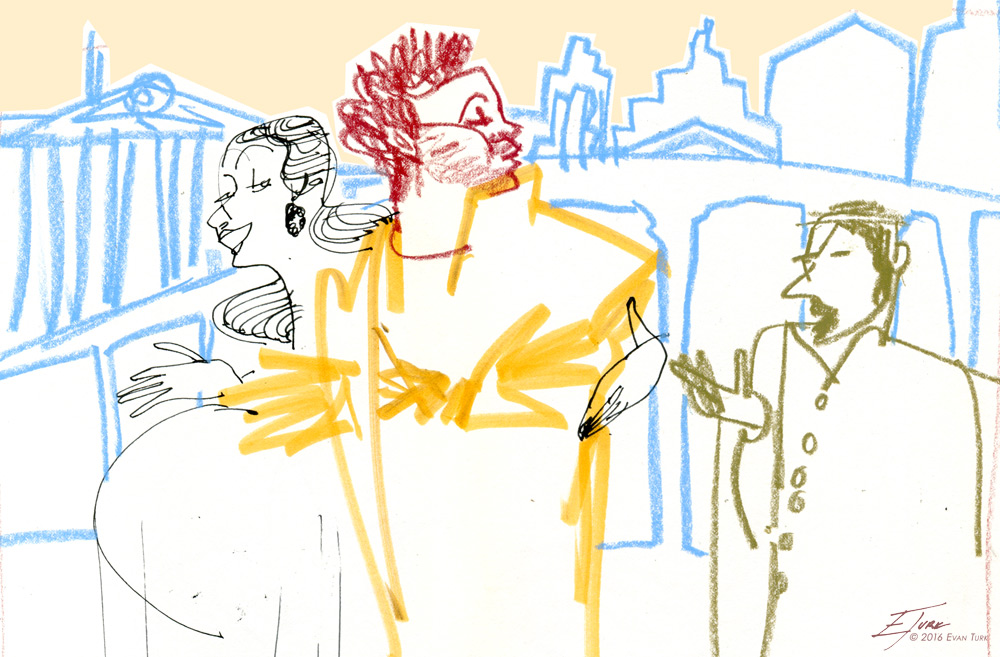I recently went to see the New York Classical Theatre's production of Shakespeare's "The Winter's Tale" in Battery Park in Lower Manhattan with my good friend Julia Sverchuk, who is an associate artist for the Theatre and does brilliant drawings of all of their productions. (See her beautiful drawings for A Midsummer Night's Dream here).
I had never seen The Winter's Tale before, but it was a fun and silly soap opera that I really enjoyed. The story begins with two kings who are childhood friends. King Leontes of Sicilia tries to get his friend, Polixenes of Bohemia, to stay longer, but is unable to convince him. When Leontes' wife, Hermione, is easily able to convince him to stay, Leontes begins to suspect that they are having an affair.
His suspicion and jealousy balloons and he orders Camillo to have Polixenes killed, despite his protestations.
Camillo instead warns Polixenes and the two escape together to Bohemia.
Leontes discovers their escape and is furious. He accuses his wife of the affair and that the child she carries is Polixenes', not his own, and imprisons her.
Hermione gives birth to a baby girl, and her friend Paulina, tries to convince Leontes to free Hermione, hoping the sight of his daughter will soften him against her. But he is not convinced, and instead orders Paulina's husband to exile the baby and abandon it somewhere.
Hermione pleads with Leontes, proclaiming her innocence, but he cannot be convinced.
Hermione faints upon hearing that their son has wasted away because of the stress of these accusations. Paulina then lets out a cry offstage and comes back to report that Hermione has died as well. Leontes laments his decisions and resolves to atone for his crimes.
Meanwhile, Antigonus goes to abandon the baby in Bohemia, naming her Perdita. He leaves her in a basket with trinkets suggesting her noble heritage. He is then eaten by a bear! Two shepherds then take the baby to raise her.
The character of "Time" is played by a bard, who announces that now sixteen years have passed.
We find out that Polixenes' son, the Prince Florizel, has fallen in love with a shepherdess, also named Perdita (!!).
Polixenes and Camillo conspire to stop the Prince's wedding to Perdita, but with Camillo's help, they flee to Sicilia in disguise.
"Time" switches his clothes with Prince Florizel, and posing as a nobleman hears how the shepherds are going to prove that Perdita is of noble birth by showing Polixenes the royal trinkets she was abandoned with in the basket.
Everyone ends up going to Sicilia, and after everyone's true identities are revealed, everyone is friends again and all is well.
In even more exiting news, Hermione has apparently been pretending to be a statue of herself for 16 years, but is actually still alive! So, that worked out well! She also forgives Leontes, I guess. And now everyone is reunited and happy. Except for Paulina's husband, who was still eaten by a bear. But she gets together with Camillo in the end! Hooray!
It's an absurd story, but it was so wonderfully brought to life by the actors and the production of the New York Classical Theater. It's so beautiful seeing these plays staged against some of NY's most beautiful backdrops. The expressive actors always make it so satisfying to draw! Definitely go check out this production, on through August 7 at Battery Park, and from August 9-14 in Brooklyn Bridge Park, Dumbo.
More information below:














No comments:
Post a Comment